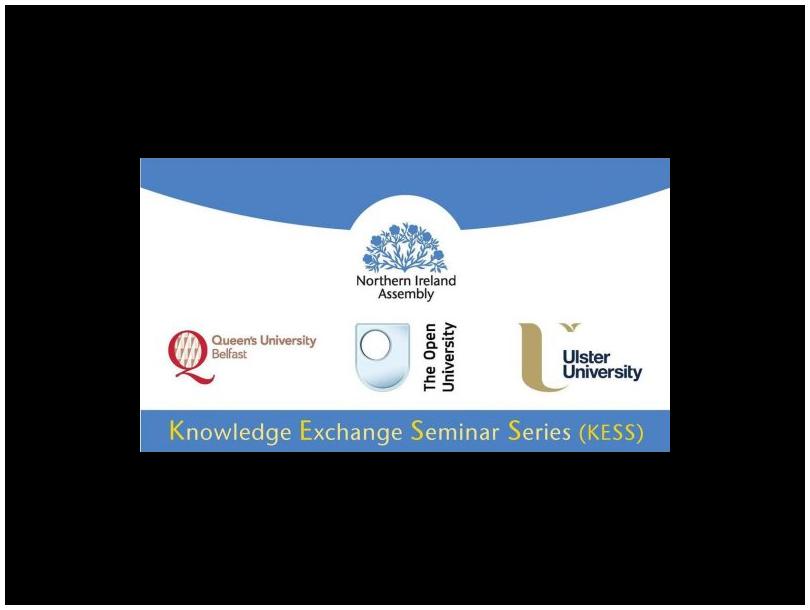Knowledge Exchange Seminar - 10 May 2017 - Preventative Health: New Developments

NI Assembly RaISe

Knowledge Exchange Seminar - 10 May 2017 - Preventative Health: New Developments
Dr Joe Duffy, Dr Gavin Davidson (QUB), Dr Subhajit Basu (Leeds University) and
Prof Katherine Pearson (Penn State University) - Modernising Adult Social Care in Northern Ireland
This seminar presentation will focus on the key findings from research this team published for the Commissioner for Older People Northern Ireland (COPNI) in June 2015, the full report can be accessed here: http://www.copni.org/images/publications/COPNI_Report_-_03_June_2015.pdf . One of the innovative recommendations from this research for modernising adult social care was that Northern Ireland should consider the introduction of a Preventative/Support Visit for all older people once they reach the age of 75. The Preventative Visit is legally mandated in Denmark through the Consolidation Act on Social Services (2013) where, in Section 79a of this Act, this is described as follows: “The municipal council shall offer preventive home visits to all citizens who have attained the age of 75 and are residents of the municipality. The municipal council shall offer at least one annual preventive home visit.” (Part 14, Section 79a, Consolidation Act no.1093 of 5 September 2013). Furthermore, it is noted that: “the Preventive Visit has been introduced after several randomised controlled trial studies proved this service cost-efficient in that it reduces the risk of becoming hospitalised or admitted to a nursing home, and proved to have a positive effect on mortality” (Rostgaard, 2012:78). The focus of this visit is on needs assessment and helping continue planning for sustained independent living (Schulz, 2010). The introduction of this scheme to Northern Ireland would, therefore, align with the theme of prevention underpinning Transforming Your Care (2011). This seminar will explore this initiative in more detail.
Dr Maria Truesdale and Dr Laurence Taggart (Ulster) – Diabetes education for adults with learning disabilities: addressing the inequalities
Health inequalities faced by people with learning disabilities (LD) is a critically important issue for primary and secondary healthcare services. Although health inequalities are, to an extent avoidable, it is evident that existing patterns of healthcare provision are insufficient and likely to be in contravention of legal requirements under the Disability Discrimination Acts 1995 and 2005 and the UN Convention on the Rights of Persons with Disabilities. The Northern Ireland Department of Health, Social Services and Public Safety’s policies (Equal Lives, DHSSPS, 2005) and guidance (LD Service Framework, DHSSPS, 2012) have emphasised the central role of mainstream health services in meeting the health needs of this population. Understanding the determinants of health inequalities helps identify potential solutions including: making ‘reasonable adjustments’ in all areas of health promotion and healthcare in light of the specific needs of this population and acting within the legal framework of the Mental Capacity Act (2005). This seminar discusses how a national self-management Type 2 diabetes education programme (DESMOND) was adapted for adults with a LD (DESMOND-ID). It illustrates how making reasonable adjustments can support these individuals to increase their knowledge and understanding of diabetes resulting in better self-management and improved glycaemic control with the support of their family and/or paid carer.
Dr Gillian Prue, Dr Olinda Santin, Dr Lesley Anderson, Dr Donna Graham and Prof Mark Lawler (QUB) – Making the case for universal HPV vaccination.
Prevention of human papillomavirus (HPV)-related cancers is an increasingly prominent public health issue. The current UK strategy of vaccinating girls alone does not provide males with adequate protection against HPV infection and HPV-related diseases, particularly men-who-have-sex-with-men (MSM). In response to this, in November 2015, the Joint Committee on Vaccination and Immunisation (JCVI) published a statement on HPV vaccination of MSM. This statement recommended that the vaccination programme be extended to MSM aged up to 45 years via a genitourinary (GUM) or Human Immunodeficiency Virus (HIV) clinic, or opportunistic vaccination via a GP. In August 2016, the Health Minister announced the investment of £100,000 for the targeted vaccination of MSM in NI who attend GUM and HIV clinics. There are doubts that HPV vaccinations can be effectively targeted to MSM, and it has been argued that the only feasible way to protect MSM is by vaccinating all adolescent boys. The JCVI are currently considering the merit of extending the vaccine to all adolescent males. There are a number of countries that currently recommend and provide universal, gender neutral HPV vaccination. In order to inform the current HPV vaccine policy discussion, we will present our work on knowledge and attitudes to HPV and HPV vaccination in MSM and parents of adolescent boys. We will also present data on the cost-effectiveness of including males in HPV vaccination programmes.
Date and Time
Location
Parliament Buildings
Stormont
Belfast
BT4 3XX
United Kingdom
